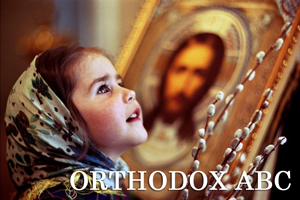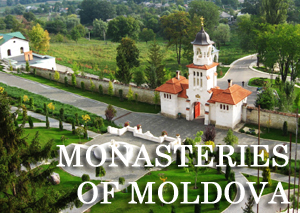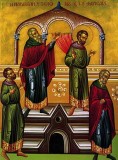
Introduction
The Sunday of the Publican and the Pharisee is the first Sunday of a three-week period prior to the commencement of Great Lent. It marks the beginning of a time of preparation for the spiritual journey of Lent, a time for Orthodox Christians to draw closer to God through worship, prayer, fasting, and acts of charity. It is also on this day that the Triodion is introduced, a liturgical book that contains the services from this Sunday, the tenth before Pascha (Easter), to Great and Holy Saturday.
Biblical Story
The name for this Sunday is taken from the parable of our Lord Jesus Christ found in Luke 18:10-14. This is the story of two men, one a Pharisee, a member of a Jewish sect known for its diligent observance of the Law, and the other a Publican, a government official charged with the responsibility of collecting taxes.
Both men enter the temple, and the Pharisee stands openly and prays, thanking God that he is not like other men, specifically extortioners, the unjust, adulterers, “or even this tax collector” (v. 11). He then begins to list his religious accomplishments by stating, “I fast twice a week, and I give tithes of all that I possess” (v. 12).
In direct contrast to the pride of the Pharisee, the Publican goes to a place where he will not be noticed by others and beats his breast saying, “God, be merciful to me a sinner!” (v. 13).
Having told this story, Jesus affirms that it was the Publican who returned home justified and forgiven rather than the Pharisee. He states, “Everyone who exalts himself will be humbled, and he who humbles himself will be exalted” (v. 14).
The theme of this parable is repentance. Repentance is the door through which we enter Lent, the starting-point of the journey to Pascha. To repent signifies far more than self-pity or futile regret over things done in the past. The Greek term metanoia means “change of mind.” To repent is to be renewed, to be transformed in our inward viewpoint, to attain a fresh way of looking at our relationship with God and with others. The fault of the Pharisee is that he has no desire to change his outlook; he is complacent, self-satisfied, and so he allows no place for God to act within him. The Gospel depicts him as a man that is pleased only with himself who thinks that he has complied with all of the requirements of religion. But in his pride, he has falsified the meaning of true religion and faith. He has reduced these to external observations, measuring his piety by the amount of money he gives.
The Publican, on the other hand, truly longs for a “change of mind.” He humbles himself, and his humility justifies him before God. He becomes, in the words of the Sermon on the Mount (Matthew 5:3), “poor in spirit.” He acknowledges that he is a sinner, and he knows that salvation is only found in the mercy of God. Here we find an example of true humility, an essential aspect of repentance. A “change of mind” and the transformation of our lives can only happen when we humble ourselves before God, acknowledge our willingness to turn from sin, and receive His grace into our lives.
Our preparation for Lent thus begins with a prayer for humility, the beginning of true repentance. Through repentance, we can find and return to the true order of things, a restoration of our spiritual vision that will guide us in a very difficult and challenging world. By entering Great Lent in humility and repentance, we can attain deeper communion with God as we receive His forgiveness and He blesses by guiding us to greater spiritual heights.
Orthodox Christian Celebration of The Sunday of the Publican and the Pharisee
The Sunday of the Publican and the Pharisee is celebrated with the Divine Liturgy of Saint John Chrysostom, which is preceded by the Matins service. A Great Vespers is conducted on Saturday evening. The hymns of the Triodion for this day are added to the usual prayers and hymns of the weekly commemoration of the Resurrection of Christ. The naming of the Sunday is related to the reading of the story from the Gospel at the Divine Liturgy.
Scripture readings for the Sunday of the Publican and the Pharisee are: At the Orthros (Matins): The prescribed weekly Gospel reading. At the Divine Liturgy: II Timothy 3:10-15; Luke 18:10-14.
The week that follows the Sunday of the Publican and Pharisee is designated by the Church as a non-fasting week. All foods are allowed on everyday of the week, including Wednesday and Friday. This dispensation from fasting is offered as a way of indicating that Great Lent and a more intense fasting period is approaching.
Hymns And Prayers Of The Sunday Of The Publican And The Pharisee
Doxastikon of the Aposticha, Saturday Vespers (Tone plagal of the first)
Mine eyes are weighed down by my transgressions, and I cannot lift them up and see the height of heaven. But receive me, Savior, in repentance as the Publican and have mercy on me. Listen »
Troparion after “Have Mercy”, Matins Service (Tone plagal of the second)
Have mercy upon me, O God, according to Thy loving kindness and according to the multitude of Thy tender mercies blot out my transgressions.
As I ponder in my wretchedness the many evil things I have done, I tremble for the fearful day of judgment. But, trusting in Thy merciful compassion, like David do I cry out to Thee: have mercy upon me, O God, in Thy great mercy. Listen »
Doxastikon of the Ainoi, Matins Service (Tone Plagal Fourth)
O Lord, Thou hast condemned the Pharisee who justified himself by boasting of his works, and Thou hast justified the Publican who humbled himself and with cries of sorrow begged for mercy. For Thou dost reject proudminded thoughts, but Thou dost not despise a contrite heart. Therefore in abasement we fall down before Thee who hast suffered for our sake: grant us forgiveness and great mercy.
Kontakion (Tone Four)
Let us flee the proud speaking of the Pharisee and learn the humility of the Publican, and with groaning let us cry unto the Savior: Be merciful to us, for Thou alone art ready to forgive.
Source: Great Lent, Holy Week, and Pascha
Greek Orthodox Archidiocese of America
 Memorial house of romanian elder Sofian Boghiu Consecrated in his native Village
Memorial house of romanian elder Sofian Boghiu Consecrated in his native Village 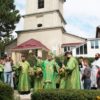 On the 14th Sunday after Pentecost, His Eminence Metropolitan Vladimir celebrated the Divine Liturgy in the St. Nicolas Monastery, Dobrusa village, Soldanesti region
On the 14th Sunday after Pentecost, His Eminence Metropolitan Vladimir celebrated the Divine Liturgy in the St. Nicolas Monastery, Dobrusa village, Soldanesti region  Inauguration of the volume of articles presented at the National Scientific Conference “The Orthodox Church and the State: Faith and Knowledge”
Inauguration of the volume of articles presented at the National Scientific Conference “The Orthodox Church and the State: Faith and Knowledge”  The 12th Sunday after Pentecost – kindness in God changes the world we live in
The 12th Sunday after Pentecost – kindness in God changes the world we live in  The 11th Sunday after Pentecost – loving our God and our neighbor
The 11th Sunday after Pentecost – loving our God and our neighbor 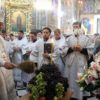 The Transfiguration of the Lord, celebrated in the Nativity of the Lord Cathedral in Chisinau
The Transfiguration of the Lord, celebrated in the Nativity of the Lord Cathedral in Chisinau  His Eminence Metropolitan Vladimir celebrates 65th anniversary
His Eminence Metropolitan Vladimir celebrates 65th anniversary  Divine Service at the St. Theodore of Tyre Monastery (Ciuflea) in Chisinau, and congratulation of Archimandrite Nicolae (Rosca), the Monastery’s confessor-administrator, on the 50th anniversary.
Divine Service at the St. Theodore of Tyre Monastery (Ciuflea) in Chisinau, and congratulation of Archimandrite Nicolae (Rosca), the Monastery’s confessor-administrator, on the 50th anniversary.  The Tenth Sunday after Pentecost: Divine Liturgy in the Nativity of the Lord Cathedral in Chisinau
The Tenth Sunday after Pentecost: Divine Liturgy in the Nativity of the Lord Cathedral in Chisinau 
